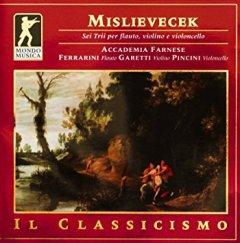Josef Myslivecek - 6 Flute Trios (1996)
Josef Mysliveček - 6 Flute Trios (1996)

Trio No. 1 in D major 1. Vivace 2. Larghetto 3. Minuetto e trio Trio No. 2 in G major 4. Allegro 5. Andantino 6. Allegretto Trio No. 3 in C major 7. Allegretto 8. Andante 9. Minuetto e trio Trio No. 4 in A major 10. Comodo 11. Andante 12. Minuetto e trio Trio No. 5 in F major 13. Allegro 14. Andante 15. Allegretto Trio No. 6 in B flat major 16. Vivace 17. Andante 18. Allegro Accademia Farnese: Claudio Ferrarini - flute Elisabeta Garetti - violin Luca Pincini – cello
Josef Myslivecek (9.3.1737 Praha - 4.2.1781 Rome), the greatest Czech composer of 18th century. Son of a miller from Prague (tenant of two famous mills situated on both sides of Charles Bridge: Sova's Mills at Kampa and Novotny Footbridge at New Town - known as Myslivecek's till now - which serves as Museum of B.Smetana today). He got the basic musical education at Jesuit College, later he studied mathematics, statics and hydraulics. In 1761 he became the flour-milling master but he did not take over father's mills; he rather abandoned them in favour of his brother, devoted himself fully to music. He studied composition under F. Benda and F. Habermann, later under J.Seger. After the success of first works (6 "sinfonies" named after first 6 months of the year) he left to Italy to study opera composition under G.B.Pescetti in Venice. He wrote his first opera in 1764 (it did not pass on till today). He got a success and wrote another opera for Naples called "Il Belleferonte" in 1767 which meant definitive success and fame all over the country. He was called "Il divino Boemo" (Divine Czech); he is also known as Giuseppe Venatorini which is Italian translation of his name. After the success in Naples he is at the top of his career. He got a glory, lot of money and was writing his best works. In about 1770 he met W.A.Mozart in Bologna; they maintained friendly relations since that time. Mozart often expressed his admiration of Myslivecek's works and that was one of the reasons why he took a fancy to Prague, Myslivecek's bithplace. In 1777 he had a accident in a carriage on his way to Munich. He got an infection in his face wounds; he spent a year in attempts to heal the wounds but finally his face got badly distorted. In 1779 he wrote one more opera (Armida) which unlike the previous ones was in a grim mood. After bad success he quit musical life and two years later he died in poorness and oblivion. --- czechmusic.net
download (mp3 @160 kbs):
Zmieniony (Poniedziałek, 31 Lipiec 2017 14:52)








